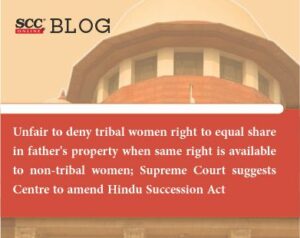Supreme Court: In a case where a woman belonging to Scheduled Tribe sought share on compensation awarded for the acquisition of land belonging to her ancestors, the bench of MR Shah* and Krishna Murari, JJ, though could not granter her relief under the provisions of the Hindu Succession Act, 1956 as she was not found entitled to any right of survivorship as Section 2(2) of the Hindu Succession Act specifically excluded the female member of the Scheduled Tribe, it has asked the Central Government to consider it just and necessary to withdraw the exemptions provided under the Hindu Succession Act in so far as the applicability of the provisions of the Hindu Succession Act to the Scheduled Tribes and whether to bring a suitable amendment or not.
Stressing on the right to equality guaranteed under Articles 14 and 21 of the Constitution of India, the Court observed that there is no justification to deny the right of survivorship so far as the female member of the Tribal is concerned. The Court said,
“When the daughter belonging to the non-tribal is entitled to the equal share in the property of the father, there is no reason to deny such right to the daughter of the Tribal community. Female tribal is entitled to parity with male tribal in intestate succession. To deny the equal right to the daughter belonging to the tribal even after a period of 70 years of the Constitution of India under which right to equality is guaranteed, it is high time for the Central Government to look into the matter and if required, to amend the provisions of the Hindu Succession Act by which the Hindu Succession Act is not made applicable to the members of the Scheduled Tribe.”
In the case at hand, a tribal woman had challenged the judgment of the Orissa High Court, confirming the order passed by the Reference Court in a dispute relating to the apportionment of the amount of compensation with respect to the acquisition of the land belonging to her ancestors. She had claimed 1/5th share in the amount of compensation. The Reference Court rejected the claim mainly on the ground that as the parties belong to Scheduled Tribe Community, the provisions of the Hindu Succession Act shall not be applicable and therefore the appellant being a daughter shall not be entitled to the share in the amount of compensation. The said order was confirmed by the High Court.
When the matter reached the Supreme Court, it was left with no choice but to affirm the High Court’s finding as it observed that,
“If the claim of the appellant on the basis of the survivorship under the Hindu Succession Act is accepted in that case it would tantamount to amend the law. It is for the legislature to amend the law and not the Court.”
The Court, observed that so long as Section 2(2) of the Hindu Succession Act stands and there is no amendment, the parties shall be governed the said provision. Therefore, though on equity, the Court may be with the appellant being daughter and more than approximately 70 years have passed after the enactment of the Hindu Succession Act and much water has flown thereafter, it cannot grant the grant the benefit of survivorship to the appellant daughter till the Section 2(2) of the Hindu Succession Act is amended to include the members of Scheduled Tribes.
[Kamla Neti v. Special Land Acquisition Officer, 2022 SCC OnLine SC 1694, decided on 09.12.2022]
*Judgment by: Justice MR Shah

